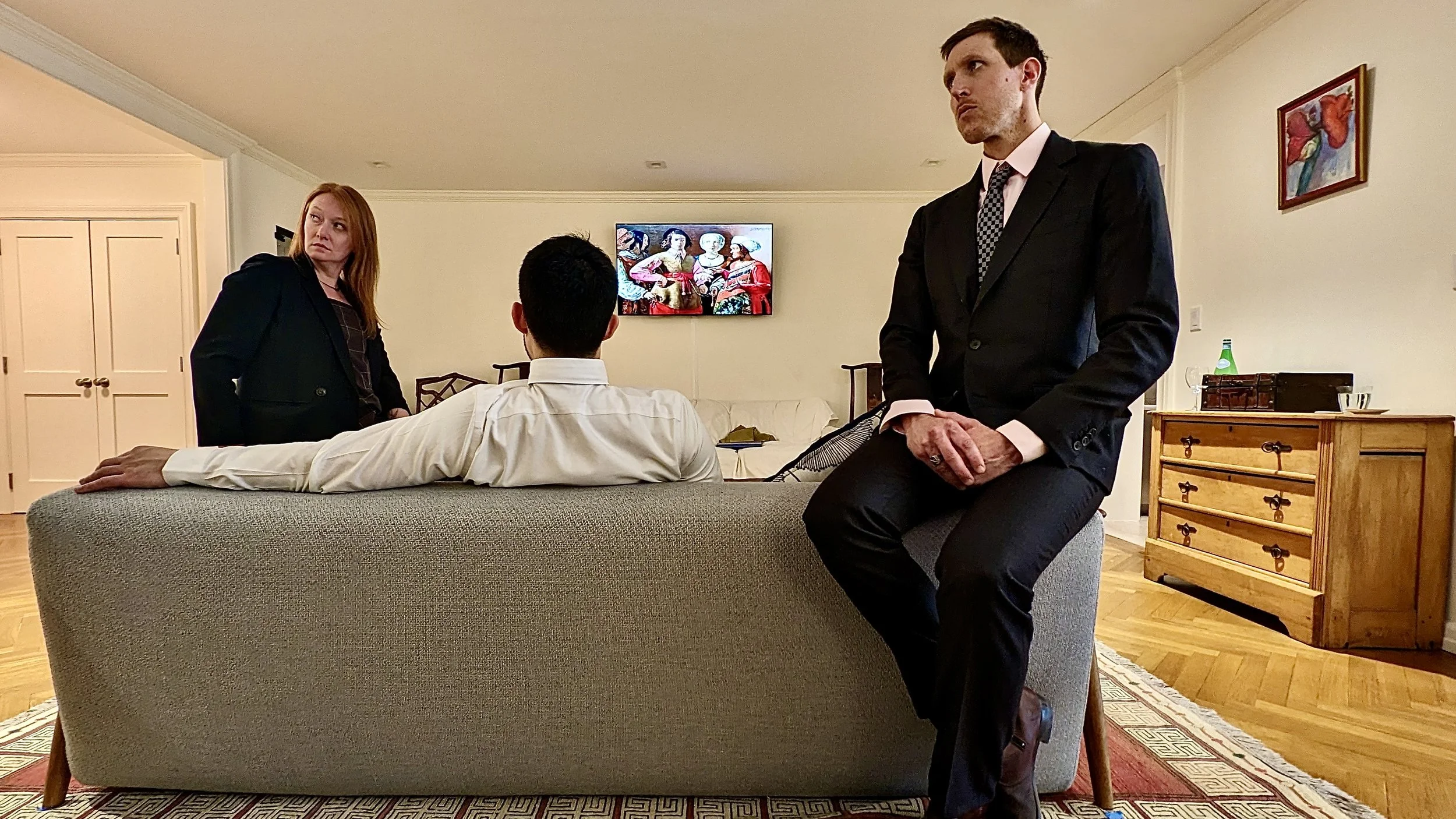Theater April 2025
Surrender to Language Dense but Frisky: On Letter of Intent
By Billy McEntee
Claire Buckingham, Dan Kuan Peeples, and Ben Forster in Letter of Intent. Photo: John Jesurun.
[…]
In the garden-level apartment of a chic townhouse, four suited-up concierges (Asta Hansen, Claire Buckingham, Benjamin Forster, and Dan Kuan Peeples) discuss how to take care of their assigned house, which may not be real. As with Barthelme, throw meaning on the backburner.
In Letter of Intent, an audience of twenty sits on opposite sides of a neutral, Wayfair-looking couch; there are parquet floors, a billowing monstera plant, and, depending on your vantage, the glimpse of a kitchen that’s giving stainless steel. There isn’t much else: think corporate housing.
A staid interior checks out for the concierges’ gathering spot, and minimal staging of sitting down and getting up from the couch brought attention to Jesurun’s writing, which is a workout.
“We are on the first floor known as the second shelf of the Caligari cabinet. Are you guys following me? I’ll go over it again,” says the one who seems to be the quartet’s leader (Forster).
He goes on:
”We’re in a house obviously, from the outside it has four floors. It has a basement and several sub basements. We’ve been working here for ten years and you’ve never even known it was there. The two upper floors of the house are subdivided into two floors each. Then there is the penthouse where no one goes. And that penthouse is vertically divided into eight compartments.
That’s our exposition, shared in the first few minutes. Welcome to the mysterious home that four concierges are tending.
Worried about invaders, the leader occasionally thinks he sees us, the audience: unwelcome spirits here to disrupt whatever guarding the concierges are tasked with. One moment we’re there, he says, another we’re not. Like the home, which also has a “cheese vault,” Jesurun’s writing is full of nooks and crannies: words spill out, double over themselves, and find the logic in their illogic. The house may be a figment—the sunlight, breeze, and mosquitos, the concierges deduce, are all mechanical—but that doesn’t mean they’re allowed to slip when it comes to duty.
“You’re supposed to reveal all foreign relations,” the leader tells another concierge who questions whether her down-the-street hookup was real. Forster, in particular, handles Jesurun’s language with dexterity—every decision, even whether or not it’s safe to consume Chinese takeout, is dire, leaving no room for humor, which is to say plenty for chuckles at his expense.
As the concierges, Waiting for Godot-style, anticipate the delivery of a real piano, they further question if none of them are real, if the house isn’t real, and if their jobs are purposeless, who among them is to be trusted? Even as Buckingham brings a more grounded grace to her concierge, she still stages her own death to see how others react to it.
Here, Jesurun eviscerates people’s dedication to having a job, even if that job is morally muddy or effectively pointless.
Days (months?) blur together, and new entrances signal new scenes, but a finer hand would have helped: amongst the production’s slender staff, a lighting designer (Jeff Nash) is credited, but the play is essentially a cue-less stream of text awash in overhead practicals. A lighting shift or physical choice would have better separated beats.
But separation may not be Jesurun’s goal; the writing, and the concierges’ work, is relentless. Soon, a new family will come into the house, or fresh concierges, or perhaps the home will evaporate. Delusional but striving, the concierges consider their work, whatever it is, serious, and it is to Jesurun’s credit that despite their job’s vagueness, he keeps the dialogue compelling.
One concierge (Hansen) had died—who knows how, she was the group’s oldest, maybe it was just her time, but also, do we ever really escape our work?—yet she resurfaces to meet the hand-off of that momentous piano.
But wasn’t she dead dead, another concierge (Peeples) asks? “I was for a while,” she replies. “Everything comes and goes.” In Jesurun's fun house, inconsistency is consistency—and truth. To grasp language is to pin a ghost.


